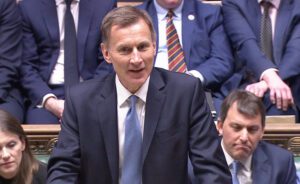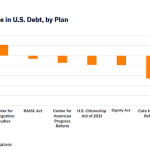
Inflation in the UK unexpectedly rose for the first time in nearly a year to 4 per cent in December, dampening hopes that the Bank of England will lower interest rates in a matter of months, official figures released today show.
The rate of price growth in the UK increased from 3.9 per cent in the previous month, but was still well below the Bank of England’s expectation of 4.6 per cent, according to the Office for National Statistics.
City analysts had anticipated the rate to drop to 3.8 per cent.
Elevated price increases for tobacco products as a result of an increase in sales taxes pulled headline CPI inflation higher last month, underscoring that the final stages of bringing inflation back to the 2 per cent target from its peak of 11.1 per cent in October 2022 will be tough.
Grant Fitzner, chief economist at the ONS, said: “These [tobacco price increases] were partially offset by falling food inflation, where prices still rose but at a much lower rate than this time last year.” Food inflation dropped to 8 per cent from 9.2 per cent.
“Meanwhile, the prices of goods leaving factories are little changed over the last few months, while the costs of raw materials remain lower than a year ago,” he said.
The surprise inflation jump will curtail expectations of an early interest rate cut and reinforce the Bank of England’s concern that loosening policy too soon may prevent inflation from falling back to its 2 per cent target sustainably. Inflation has topped that measure since July 2021.
What rising inflation means for mortgages and phone bills
Services inflation, which the Bank of England monitors closely to feed into its interest rate decisions, rose to 6.4 per cent from 6.3 per cent. Core inflation, which removes volatile food and energy price changes and is seen as a measure of underlying price pressures in the economy, remained unchanged at 5.1 per cent.
Disruption to global trade flows as a result of Iran-backed Houthi attacks on ships passing through the Red Sea has also raised concerns about rising petrol and goods prices.
Jeremy Hunt, the chancellor, said: “As we have seen in the US, France and Germany, inflation does not fall in a straight line, but our plan is working and we should stick to it.”
Eurozone inflation rose to 2.9 per cent in December, while US inflation increased to 3.4 per cent.
Investors have rallied behind a scenario in which the UK experiences a rapid decline in inflation back to the official 2 per cent target in the early half of this year, allowing the Bank of England to lower interest rates sharply from their present level of 5.25 per cent, a 15-year high.
Deutsche Bank, Oxford Economics, ING and Investec have projected that inflation will be back to or very close to the official target by the spring.
The UK economy is also forecast to broadly stagnant in 2024, repeating its performance last year, amplifying pressure on the Bank of England to loosen monetary policy to stimulate demand. Lower interest rates make it less attractive to save and strengthen incentives for borrowing which should, in theory, boost spending.
Andrew Bailey, the governor of the Bank of England, and the monetary policy committee, the nine-strong group in charge of setting the UK base rate, have pushed back against market expectations for sweeping rate cuts.
The MPC has insisted that it intends to keep financial conditions in restrictive territory for an “extended period”. City analysts, though, expect the group to soften up that guidance at their next meeting on February 1, potentially paving the way for interest rate cuts from May.
Read more:
UK inflation rate rises unexpectedly to 4%






